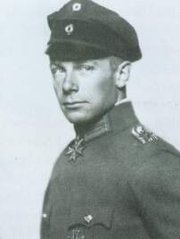Ernst Udet
|
|
Ernst Udet (April 26 1896 - November 17 1941) was the second-highest scoring German flying ace of World War I. He was one of the youngest aces and was the highest scoring German ace to survive the war.
Born in Frankfurt, Udet was fascinated with aviation from early childhood. He wanted to join the army in 1914 but was only 160 cm tall and did not qualify. He managed to join the German Army Air Service in 1915. He flew with Hermann Göring and became a German hero with 62 kills to his credit. Later he questioned Göring's achievements during the war.
Between the wars, he was a stunt pilot and a playboy. He flew for movies and for airshows (e.g. picking the cloth from the ground with the top of the wing). He appeared with Leni Riefenstahl in the film S.O.S. Eisberg. He was married but is said to have had many lovers on the side. His talents were many (juggling, drawing cartoons, party entertainment, etc.).
He joined the Nazi party in 1933 when Göring promised to buy him two new US airplanes, the Curtiss Hawk. Udet became a major proponent of the dive bomber, taking credit for having introduced it to the Luftwaffe, who were already interested in such designs. By 1936 he had, due largely to his political connections, been placed in command of the T-Amt, the Reich Air Ministry's development wing. He had no real interest in this job, especially the bureaucracy of it, and the pressure led to his addiction to alcohol (brandy and cognac) and amphetamines (Pervitin).
When the Second World War started, his internal conflicts grew more intense. Aircraft production requirements were much more than the German industry could supply, notably given limited access to raw materials such as aluminium. Göring responded to this problem by simply lying about it, which further conflicted Udet. After the Luftwaffe's defeat during the Battle of Britain, Göring deflected Hitler's ire by blaming Udet. The attack on the Soviet Union drove him into despair.
On November 17, 1941 he committed suicide, shooting himself while speaking on the phone to his mistress. Some evidence indicates that his intricate relationship with Göring, Erhard Milch and the Nazi party in general was at the root of his mental breakdown.
At his funeral he was lauded as a hero who died in flight while testing a new weapon.
See also
- Carl Zuckmayer's play Des Teufels General ("The Devil's General"), whose main character is based upon the biography of Ernst Udet.de:Ernst Udet

